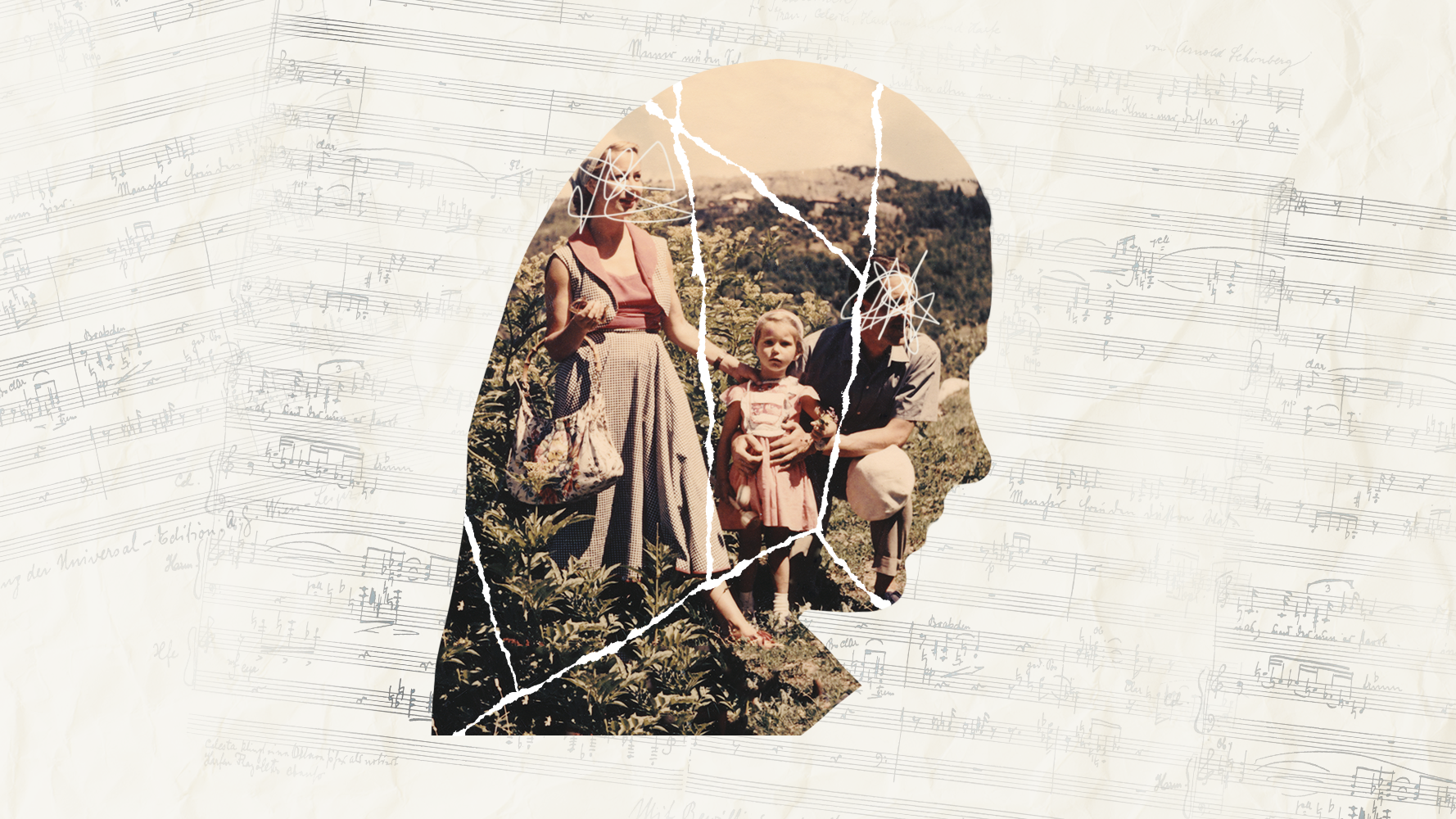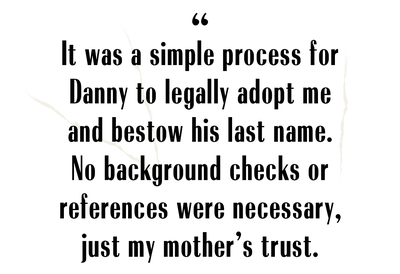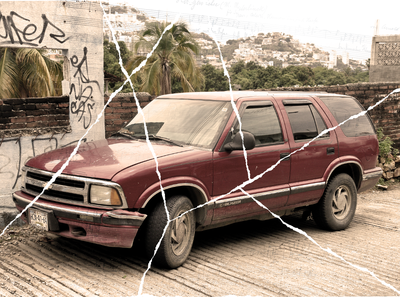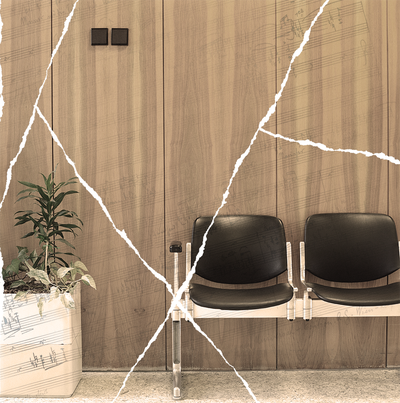I Was Adopted by a Sex Offender
How my stepfather's past changed my future.

In the legal counselor’s office at the battered women’s shelter, I sat in a numb haze. Through the thick August humidity and the fan’s white noise, I clung onto a wisp of clarity: I knew it.
“No, you didn’t.”
The sting of my mother’s exasperation jolted me back into reality. I was unaware I had muttered this thought aloud. How could I possibly have known that Danny*, her husband and my adoptive stepfather, was a sex offender?
My mother married Danny when I was 4 years old. Their nuptials took place in the same little white church where she had hastily wed my biological father in an attempt to rectify her unplanned teenage pregnancy. Because my father abandoned us shortly thereafter, it was a simple process for Danny to legally adopt me and bestow his last name. No background checks or references were necessary, just my mother’s trust. And in that county today, that is still all that’s required.
I thought we were a normal family. My mother worked 12-hour shifts at a health care facility while Danny worked 9-to-5 in IT. Fast food and freezer meals were common. Church was something we were supposed to go to and then felt guilty about on the Sundays we didn’t. We moved frequently, first living in farm country in the southeast, then in a small-town, and eventually in a brick two-story in the big city, complete with a yard and a golden retriever.
But what wasn’t normal was my lack of memories, even as a child. The few I retained were sparse and sporadic, interspersed with long stretches of time I could not recall.
I remember my mother reaching back from the front passenger seat of Danny’s red Blazer, offering me a McDonald’s vanilla ice cream cone after the bladder surgery I had at 5 years old. Now I know that bladder dysfunction at that age is often a sign of sexual abuse.
I remember my mother lying to the nurse in the pediatrician’s office about my black eye when I was 7 years old. I don’t remember Danny punching me, just that my mother protected him.

My childhood was filled with screaming matches, broken furniture, and fear. Each of my altercations with Danny ended with my mother minimizing Danny’s maltreatment, forcing me to accept the blame and apologize to him. I learned to feel perpetually guilty and to distrust myself. My body and mind bore the evidence of Danny’s mistreatment, but my mother couldn’t see it. My reality wasn’t real to her.
And yet, I loved my mother desperately. Hungrily. Despite her ambivalence toward my abuse, I know she loved me in the best way she could. I felt her love in the gentle trace of her fingers over mine, as if quietly cherishing our shared flesh and blood.
She never discovered self-respect or her own agency. Her sense of self was limited to her relationship with Danny, endlessly forgiving his behavior, not realizing that was her role in an abusive cycle.
I would have followed in her footsteps if it weren’t for high school band. I poured myself into my flute’s resonant tones and soaring range, fluid fingers and pithy articulation. One day my self-esteem sparked. After a rough rehearsal, my band director asked those of us who practiced daily to raise their hands. Hesitantly, I did so. When he pointed a finger at me and said, “I believe you”, it transformed me. Having someone recognize and praise my effort provided a new perspective on myself and altered how I saw things at home. I learned what my mother couldn’t teach me: to speak up and to think for myself.
Around this time, my mother left Danny and I alone for a few days, while she went on a trip with my brothers. I don’t know what I did wrong, but Danny’s punishment for me was something he hadn’t done before. As he unhooked the loop of his brown leather belt and instructed me to pull down my pants so he could whip me with it, I realized that he was doing this for his gratification. For the first time, I stood tall and glared back at him defiantly, as if to communicate that I knew what he was up to. His controlled expression deteriorated into a weary acknowledgement; he had received my message.

From then on, my body would tense up in anxiety around Danny and I would lash out defensively. I became aware of him watching me, even when I thought I was alone in the shower. I began to isolate myself in my room when Danny came home from work, withdrawing from my family completely. I didn’t want to be there anyway: Family time often included Danny lounging in his green chair, fly open, fondling himself with his feet up in front of the TV while my mother sat next to him in her matching recliner.
Get exclusive access to fashion and beauty trends, hot-off-the-press celebrity news, and more.
Danny accused me of having an affair with my band director, tarnishing my only safe haven. My mother brushed off his accusation and convinced him to let me stay in band, but the damage was done. To prevent the perception of any wrongdoing, I soured my attitude in class and slackened my performance; I lost my first chair and my solos. From that point onward, I distrusted all of my own innocent interactions with the opposite sex.
My breaking point came the summer before my senior year. When Danny saw me packing my lunch for marching band camp, he was so livid that my 3-year-old brother climbed the stairs to alert my mother: “Daddy’s gonna hit sissy!” Even though he didn’t strike me in that moment, leaving was an easy decision. I told my mother that I was done; an hour later I walked out the door.
After several weeks of begging, my mother left Danny and we sought legal counsel together at the local battered women’s shelter. While I felt strong in my conviction that Danny was abusive to me, I also felt like a fraud because of my lack of memories. Like many suffering from the fallout of complex trauma, I didn’t have a concrete narrative. So when they asked me if Danny ever touched me inappropriately, I said no. I could only say what I remembered.
My mother filled in the gaps for some of the long stretches of time that my memory rejected. She corroborated my allegations of abuse with her own revealing stories: Danny ripping my favorite pink sparkly dress off my 5-year-old body; how I oddly slept—perfectly still with the blankets up to my ears; my desperate, piercing cries for her after being left alone in his care.
In hindsight, I don’t know if she was so neglectful that she didn’t see what was going on, or if she didn’t recognize the behavior as abuse. Or, most heartbreaking, if she was still protecting him and withholding more damning information.

My mother found my abuse inconsequential compared to the news of her husband’s conviction for the first degree rape of a stranger while wielding a knife in 1984, 10 years before he married her and adopted me. The legal counselor informed us that the man she loved had been deemed a sex offender by the rule of law. And yet, even that wasn’t enough to condemn him. After a brief separation, my mother and Danny reconciled.
Because of that, our relationship never recovered; I chose to crash on couches and sleep in my car instead of living under their shared roof. My relationship with my mother died a slow death. Resuscitation attempts were made, but after several stagnant years I finally pulled the plug. In contrast, my family’s ostracization of me was swift and concise. None of them asked me questions or offered help. For a long time I thought their silence communicated contempt, but now I believe it was willful ignorance instead.
At 17, I was homeless with no understanding of how to navigate adult responsibilities. I didn’t understand how car insurance or the water bill worked. I wrecked my credit before I even knew what it was. I was an easy target for predatory situations, like title loans, exploitative jobs, and horrible dates. When I interacted with men, my body would physically shake and my voice would crack. I thought the problem was me—that I was unable to conform or perform like I was supposed to. I couldn’t recognize all of these personal flaws and quirks as symptoms of PTSD.
A full decade passed before I could finally say I felt like my own person. My lips learned to refrain from compulsively saying, “I’m sorry”, and my reflection in the mirror stopped reminding me of my mother’s face. My family was erased from daily thought, as if my brain had tucked them away into the same storage space where all the other lost memories are kept. My shame dissipated as I came to understand that I am not irreparably flawed, just traumatized by my past. I’ve learned that I am not Danny and I am not my mother. I will not repeat their mistakes.
I’ve changed my name. I’ve traveled the country, served in the military, worked for a regional magazine, and found my lifelong friends. I now live in New York City and attend an Ivy League university that I previously believed was outside my reach.
Although I feel born anew, my body has not forgotten its old life. My muscles recoil in agitation at anything that resembles the wet sound of sex, like a cat licking at a bead of moisture welled up on its nose. My blood pressure drops at the sight of people or animals being harmed, often causing me to faint. And in that visceral rush before a rare intimate kiss, when cheeks flush, pulse quickens, breath effervesces, and tender lips nearly touch, I sneeze.
* Name has been changed.
Models in photographs are for illustrative purposes only.